On a visit to the supermarket and two pharmacies on Sunday morning, the reality hit when a pharmacist became emotional after hearing a simple “thank you for working today.” As if a balloon had been popped by a pin.
“We’ve heard so much offense over this past couple of days, and we understand that people are very stressed, even aggressive or mistrustful,” she told me. “It’s been really exhausting.”
Just minutes later, the cashier at the supermarket where I get my groceries looked more tired than usual. “Yesterday was crazy.”
“Yesterday” was Saturday, March 14: Day 1 of recommended lockdown.
For workers around the world who are required to continue working, due to the public need of their services — or out of sheer economic survival — these are particularly uncertain times.
People in professions such as doctors or police, who in Kosovo and globally are these days giving their utmost to save lives, are to some extent trained or aware of the possibilities that such situations — crowd control, health emergencies, etc. — can provoke. For supermarket cashiers, cleaners, bus drivers, grocery store owners, gas station workers, bakers or even pharmacists — some of the unsung heroes of COVID-19 — this is unthought of.
As a burektore waitress, donning a mask and gloves to serve macchiato through a window, while the terrace of the store you work in is surrounded by yellow “Danger” tape, is a world away from business as usual.
While many are still deciding to go out for a stroll in the park, the truth is that employees of different enterprises and many small businesses owners are feeling the impact.
On Tuesday, in a considerable break from my self-isolation (and before the political situation hit ever-new levels of crazy), I went out to interview some of the people who are still working, and who now keep society functioning.
***
Wearing gloves and a mask, Drilon Krasniqi, a 27-year-old who owns a veg shop in the center of Prishtina, is one of the small business owners who continues to open his small store. He says his shop saw a 50% decrease in clients on Monday, and an even sharper decline the following day.
“This is very bad, especially for my type of business. I’ll be happy if I get to pay my expenses this month, rent, taxes…” He doesn’t expect anything else.
Every once in a while, Drilon pours a bit of sanitizer into the coins compartment of his cash box, attempting to keep the metal disinfected at all times.
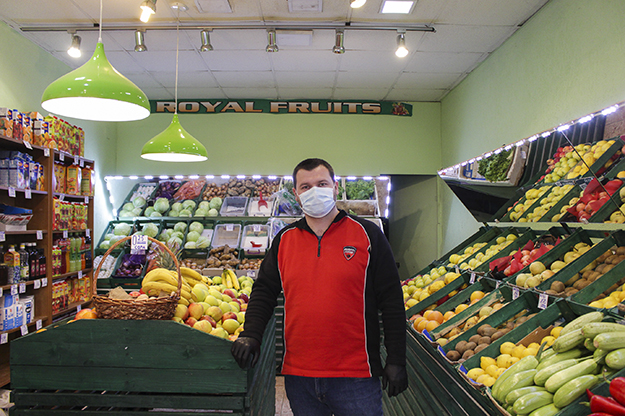
Drilon, who owns a small fruit and vegetable shop, says he has seen his customers cut in half, but he continues to work with a mask and gloves. Cristina Marí / K2.0.
“Now it’s not high season for Kosovar producers — that would be summer — so we really depend on the suppliers, and they don’t take me seriously,” he complains.
He says he has already seen some price increases from their side on products such as lemons — highly sought-after in the market, given Kosovo’s regular tea drinking culture.
Drilon was selling lemons at 1.7 euros per kilo until recently, but now he is selling them at 2.8 euros per kilo. He says he has suffered the same price increase from suppliers.
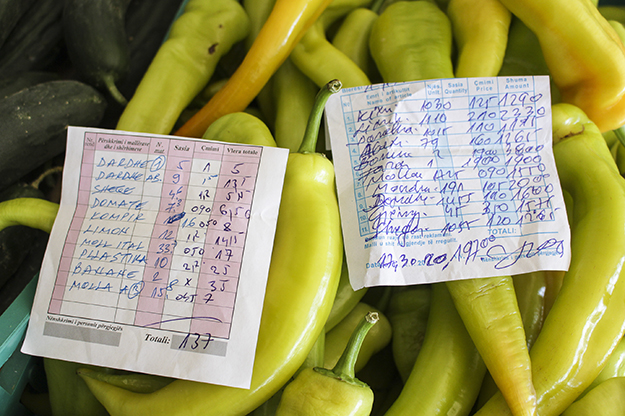
A shop owner shares his bills with suppliers, with a one week difference (left, earlier one; right most recent). Shop owners are reporting price increases in products like lemons and ginger. Cristina Marí / K2.0.
In other shops like this that I visited, suppliers’ prices for products like ginger have gone up by a euro, from 2.5 to 3.5 euros per kilo, consequently sending the price from 3 to 4 euros per kilo for the customer.
While Drilon talks about the effects of this crisis on his little family business, a neighbor comes in and hands him a bunch of surgical masks. On his way out he extends his hand to the counter and jokingly steals an orange: “Now we’re even!”
They laugh at the exchange… But it might soon be no joke. Pharmacies have run out of masks.
Respecting the new rule introduced by the Association of Pharmacists, which says that only one client at a time may be inside a pharmacy, I enter carefully, greeting the pharmacist behind the counter from an extra meter away from the glass that often separates pharmacy employees and customers.
Pharmacies are one of the few establishments that have remained open even in countries such as Spain or Italy which have declared states of emergency, implementing even stricter lockdown regulations than Kosovo.
“More than anything, people are concerned,” says a 29-year-old pharmacist who prefers not to give her name. “People are increasing the amount of medicines [they’re buying], but we’re advising against this and not allowing them to buy more medicines than they need. Those who want a higher quantity are actually people with chronic diseases who are afraid we will run out.”
She says she hasn’t been seeing her fiancé since the first confirmations of COVID-19 in Kosovo on March 13, and she is maintaining careful disinfection procedures for the end of her shift.
“When I go home after work, when I first enter the house, without touching anything, I remove all my clothes and enter the bathroom where I wash myself very carefully, but even at home I am also keeping physical distance from my parents because they are old now.”
At the pharmacy she works at in a sunny corner of the city, four people continue to keep to their regular daily shifts. “We’re together in this. We know the role of pharmacists and medical staff, and we’re united… I know we have families, but… this is our ethical responsibility now.”
***
On a walk down to the city center I stop at Salla 1 Tetori’s little recreation park, where a few young people are using the path for jogging. A woman in her 40s walks in circles, followed at a slow pace by her mother; both are sporting white surgical masks. A few more people sit around, calmly, at a distance.
Down the road, workers from the Municipality of Prishtina’s Horticulture Department are still watering the flower beds along Agim Ramadani street. A colleague messages to say that the president has called a press conference that evening. I assume that a State of Emergency will be declared within hours, and rush to interview other workers.
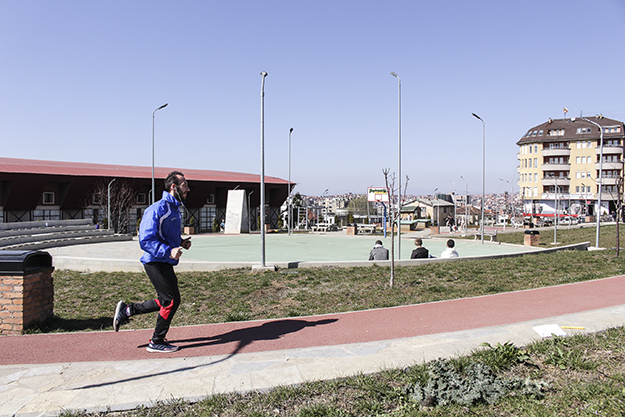
At the recreation area outside Salla 1 Tetori in Bregu i Diellit (Sunny Hill), joggers and youngsters hung out. Cristina Marí / K2.0.
In the street, near the entrance of a very calm looking hotel that would usually be all a frenzy, I ask a licensed taxi driver about the idea of quarantine.
“I’ve been to prison, so that’s actually very easy for me!” he says, laughing. Hiding his eyes behind a bold pair of black sunglasses, Halil Canolli has just returned to work last weekend after two months off, and he is taking a break.
“What a moment — I see people with and without masks in the streets, but people are putting masks on when they get into the taxi,” he continues.
Halil is wearing gloves and has got disinfectant in the car — he also describes a careful disinfection procedure when he gets home, where his five children and wife await.
He explains that his pay is calculated as a percentage of the rides he gives each month. With less people roaming the streets, his commission will surely be affected by the COVID-19 crisis.
For Asllan Beqiri, a trash truck driver, it’s different. His job security hasn’t been affected. But he is exposed to all our trash during a time of pandemic.
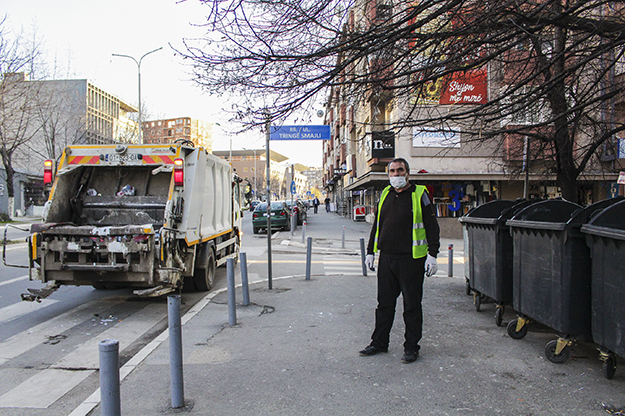
Trash truck driver, Asllan, says that if society makes it easier for trash workers, they will make it even easier in return. Cristina Marí / K2.0.
“If we don’t pick up the trash regularly, it can accumulate and it would be worse, not just for coronavirus but for other diseases,” he says.
A father of three, and with another two nephews at home, he does the Pastrimi company’s second shift of the day. “We see people still out, and then people who are on a ‘forced vacation,’ but this is not a holiday. If they make it easier for us, we will also make it easier for them.”
***
It’s past lunchtime now, but I haven’t eaten because I’m not sure where I can eat — it’s not as though there are many options!
I have an online conference scheduled with editors to discuss our coverage. Our work beyond isolation is limited now, not because we’re worried about ourselves, but mainly, because our movement can expose others who are more vulnerable.
I decide to go to Parku i Qytetit (City Park) for this online conversation; I still need to carry out more interviews once the call is over, and this way I will avoid entering my apartment, and reduce the risks that come with each entry and exit. After carefully thinking this all through, I feel a bit ridiculous — the park is full of people.
While I wait for the call to start I take the chance to have a quick chat with my family in Spain, a country now in a state of alarm as it has been highly affected by COVID-19. With daily confirmed cases on the rise, they’re now saying that the country will only reach its peak number of infections at the end of April. It means isolation will last beyond the initial 14 days.
***
In a bakery nearby Sami Frashëri school, Aisha Çoçaj cleans the counter. Approaching closing time, and with very few customers now, her face is a mixture of tiredness and joy. “We opened this bakery only five months ago,” she explains.
A family business with about eight employees, half of them women, the bakery is suffering the absence of high school students from practically next door. But despite lockdown, people still need bread.
“The day after the first cases were confirmed, on Saturday, we had so many customers, probably thinking it’s the end of the world…,” she says.
Between skepticism and caution, the 31-year-old, who is expecting a child, hopes that in a couple of weeks they will be re-supplied with another delivery of flour, a good that is hard to find right now, even in the country’s biggest supermarket chains.

Thirty-one-year-old Aisha manages a family bakery business, which opened only five months ago in Prishtina. Cristina Marí / K2.0.
“We normally have flour reserves, and so now we have capacity to bake for another two weeks,” she says. “I hope in the meantime our supplier will find a solution, because now he doesn’t have flour.”
Aisha’s bakery was also serving customers on the premises, but had to stop doing this given the instructions released this week by the Ministry of Trade and Industry, through which the government ordered businesses that both sell and serve food, to only sell for take-away purposes. The measure affects places like burektores, qebaptores, and bakeries like Aisha’s.
“Customers have been reduced probably by 30 or 40% so far, especially in the afternoon,” she says. “At the moment we’re informed, and we continue as we are day by day.”
***
It’s getting late and I keep worrying that more strict lockdown measures will be declared as of the next morning, limiting my movements in the days ahead and the information I could get from talking to people still out.
I take the first bus I see, to speak to a bus conductor that has been helping to keep the public transport running. It’s the number 4 line to Gërmia and they are not up for interviews. On the radio, I can only hear the words “panic, panic, panic.” I get off at the entrance to the National Park, where the line ends, and completely unaware that it’s apparently May 1 in there, I get directly onto another bus.
“Today there were more people in Gërmia than on a normal weekend, but they take their cars,” says Shemsi Maçastena, a beekeeper from Podujevë, who is at the wheel of the municipal yellow bus.
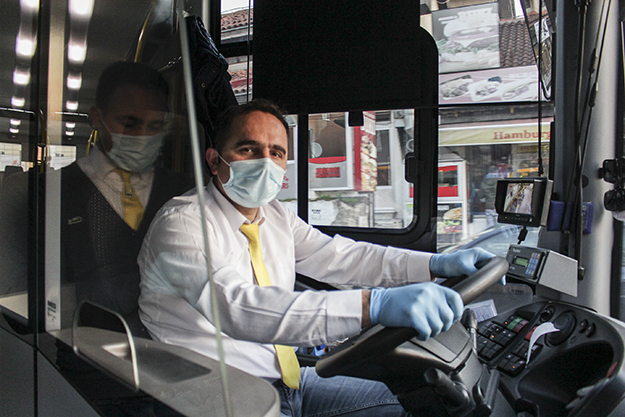
Shemsi Maçastena drives one of the buses on the Gërmia-Matiqan number 4 line, which these days sees virtually no passengers. Cristina Marí / K2.0.
A Kosovar with years of life experience as a resident of Germany and Czech Republic, he is also a total corona-skeptic.
“I just had the flu and I didn’t go to the doctor,” he says. “This will pass soon.”
Skepticism aside, he takes protection measures very seriously. Despite his very limited contact with the public — he drives behind a glass screen, with a mask on and with his hands in gloves — every few traffic lights that he stops at he cleans his hands with sanitizer. His conductor colleague, Hizdri Sherifi, who can’t avoid contact with coins and people on the bus, has gotten into the habit of constantly wetting his glove with sanitizer before receiving coins.
The buses are disinfected daily as part of measures introduced by the Municipality, and both employees follow strict cleaning procedures once they arrive home.
On the whole ride along line 4, from Gërmia to Matiqan, only three people have entered the bus, and only a young boy had to pay for the ticket. The bus runs practically empty. They say that on their whole previous shift on Monday they sold 20 tickets, while on a normal shift passengers are counted in their hundreds.
“I don’t really understand why they make us drive the bus when there are no passengers,” says Shemsi. “We are spending gas and time stupidly.”
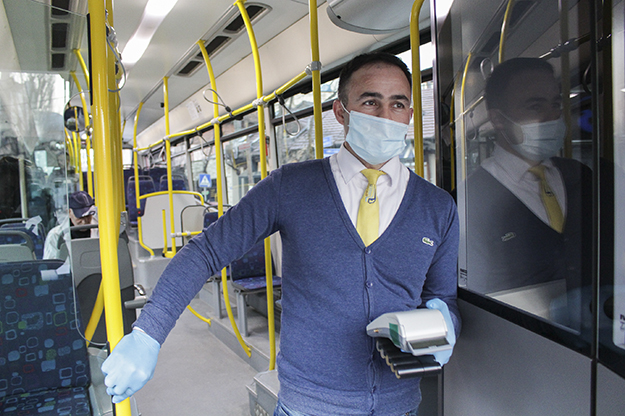
Hizdri Sherifi is in daily contact with passengers, many of them elderly, but says he is keeping a rigorous routine of disinfecting coins and hands during these days. Cristina Marí / K2.0.
I ask Hizdri how he is handling being in touch with so many passengers, especially those, like the elderly, who are more vulnerable.
“I saw this old couple and asked them, ‘Why are you taking the bus, this is risky for you?’ And they were worrying about me instead, because I am in contact with many people too. I told them: ‘This is like in the movies. Have you watched those movies where the main protagonists never get sick or killed? We’re the main characters here!’”
I hope to myself that his positive wishful thinking is right, though I’m afraid it’s not.
***
Back home, I remember all the explanations given to me by the people I’ve interviewed. Enter the apartment, remove mask and gloves carefully, don’t touch anything, undress, get into the bathroom and wash your hands and face thoroughly. I shower thoroughly. I put on new clothes. I disinfect my camera, my phone, my keys, and a few coins I’ve got in the same pocket.
I realize all the many things I have touched, and that only self-isolation can keep you and others safe. I think of the depressing news I have read today, and the workers I have talked to. I was at work too, and my walking around might have exposed vulnerable persons. A sense of ethical responsibility and a sense of guilt were with me all day for doing the very same thing.
At the end of the night, I listen to Kevin Morby’s song ‘Beautiful strangers,’ and think to myself that if we’re able to empathize with workers on the front line of this global pandemic, those who have their own families, economic circumstances, worries and wishes; if we are able to empathize with them as much as they empathize with the rest of us to sell us bread, medication or gas, despite everything, then maybe we will be OK.
In the meantime, #StayHome.K
Feature image: Cristina Marí / K2.0.








